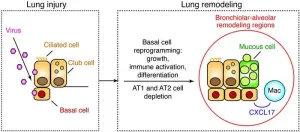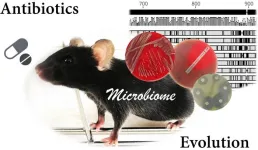(Press-News.org) A new paper in the journal The Lancet Planetary Health makes the case that pandemic prevention requires a global taboo whereby humanity agrees to leave bats alone—to let them have the habitats they need, undisturbed.
Like the SARS coronavirus outbreak of 2003, the COVID-19 pandemic can be traced back to a bat virus. Whether someone handled or ate an infected bat or was exposed to a bat’s bodily fluids in a cave or some other way, or was exposed to another animal that had been infected by a bat, we will quite likely never know. Even a virus released via a lab accident would still have originally come from a bat. But we don’t need to know all of the details in order to act.
Bats are known to be reservoirs for a wide range of viruses that can infect other species, including people. They are a source of rabies, Marburg filoviruses, Hendra and Nipah paramyxoviruses, coronaviruses such as Middle East Respiratory Syndrome (MERS) Coronavirus, and fruit bats are strongly believed to be a source of Ebolaviruses. A new analysis points to the value of a global taboo whereby humanity agrees to leave bats alone—not fear them or try to chase them away or cull them (activities that only serve to disperse them and increase the odds of zoonotic spillover)—but to let them have the habitats they need and live undisturbed.
If an ounce of prevention is indeed worth a pound of cure, then the authors emphasize that humanity simply must take the most basic, common-sense upstream steps to lower our risk of incurring another pandemic—at the interface where dangerous viruses can actually move from animals into people.
“In a globalized world with 8 billion people, we can no longer ignore our interconnectedness with the wildlife and ecosystems around us. We must change humanity’s relationship with nature if we want to prevent the next pandemic of zoonotic origin—and that can start with bats,” says Dr. Susan Lieberman, WCS’s Vice President for International Policy.
Simply put, humanity must change its broken relationship with nature, specifically wildlife and bats in particular. The costs of implementing the human behavioral changes we need are insignificant compared to the costs of another global pandemic (which could be even more devastating).
“Getting humanity to work collaboratively at a global scale underpins most of the existential challenges we face, from climate change and environmental pollution to biodiversity loss and ecosystem collapse—this at a time when earnest collaboration even at local scales often seems elusive,” notes Cornell Professor of Wildlife Health & Health Policy Steven A. Osofsky, lead author of the study.” “However, if we can actually stop hunting, eating, and trading bats, stay out of their caves, keep livestock away from areas where bats are concentrated, and if we can stop deforesting, degrading (or even start restoring) their natural habitats, we can indisputably lower the chances of another pandemic.”
The authors emphasize that allowing bats to survive and thrive will also pay billions of dollars in dividends in the form of the ecosystem services that bats provide, such as control of mosquitos and other harmful insects, as well as pollination of a wide array of important crops. They conclude that humanity’s relationships with other kinds of animals indeed merit close scrutiny, but respecting bats and the habitats they need is truly the lowest hanging fruit of genuine upstream pandemic prevention—an important better-late-than-never message now that we’ve passed the third anniversary of the COVID-19 pandemic.
The newly published analysis undertaken by Cornell University and Wildlife Conservation Society experts, An Immediate Way to Lower Pandemic Risk: (Not) Seizing the Low-Hanging Fruit (Bat), was made possible by a generous grant from the Cornell Atkinson Center for Sustainability and appears in the June 5th, 2023 issue of The Lancet Planetary Health.
The Cornell Wildlife Health Center strives to sustain a healthier world by developing and implementing proactive, science-based solutions to challenges at the interface of wildlife health, domestic animal health, human health and livelihoods, and the environment that supports us all.
The Wildlife Conservation Society
MISSION: WCS saves wildlife and wild places worldwide through science, conservation action, education, and inspiring people to value nature. To achieve our mission, WCS, based at the Bronx Zoo, harnesses the power of its Global Conservation Program in nearly 60 nations and in all the world’s oceans and its five wildlife parks in New York City, visited by 4 million people annually. WCS combines its expertise in the field, zoos, and aquarium to achieve its conservation mission. Visit: newsroom.wcs.org Follow: @WCSNewsroom. For more information: 347-840-1242. Listen to the WCS Wild Audio podcast HERE.
END
To prevent future pandemics, leave bats alone
2023-06-06
ELSE PRESS RELEASES FROM THIS DATE:
Investments advance brain research, name MRI for longtime BrainHealth couple
2023-06-06
The Laurie and Todd Platt BrainHealth Project MRI Scanner will help researchers identify neural markers of improved brain health
Center for BrainHealth® celebrates major contributions reaching more than $1 million to support discoveries of brain improvement biomarkers. This investment in advancing the science of brain health is made possible by Sarah and Ross Perot, Jr., Laurie and Todd Platt and many of their friends.
The Sammons BrainHealth Imaging Center is dedicated to discovering a scalable panel of brain measurements correlating physical changes in the brain with changes in a holistic composite metric of brain ...
Nebraska scientists closing in on long-lasting swine flu vaccine
2023-06-06
A successful long-term experiment with live hogs indicates Nebraska scientists may be another step closer to achieving a safe, long-lasting and potentially universal vaccine against swine flu.
The results are not only important to the pork industry, they hold significant implications for human health. That’s because pigs act as “mixing vessels,” where various swine and bird influenza strains can reconfigure and become transmissible to humans. In fact, the 2009 swine flu pandemic, involving ...
Bubble, bubble, more earthquake trouble? Geoscientists study Alaska's Denali fault
2023-06-06
LOGAN, UTAH, USA -- The 1,200-mile-long Denali Fault stretches in an upward arc from southwestern Alaska and the Bering Sea eastward to western Canada’s Yukon Territory and British Columbia. The long-lived and active strike-slip fault system, which slices through Denali National Park and Preserve, is responsible for the formation of the Alaska Range.
“It’s a big, sweeping fault and the source of a magnitude 7.9 earthquake in 2002, that ruptured more than 200 miles of the Denali Fault, along with the Totschunda Fault to the east, causing significant damage to remote villages and central Alaska’s infrastructure,” says Utah State University ...
Movement symptoms in dystonia are caused by spinal cord dysfunction
2023-06-06
Many neurological conditions that involve involuntary muscle contractions have long been considered as diseases of the brain. However, both the brain and the spinal cord contain many nerve cells associated with movement.
The research, published in Science Translational Medicine, used state-of-the-art mouse genetics to distinguish whether the brain or spinal cord was responsible for the disorganisation of movement experienced by dystonia patients.
Focusing on the most common inherited form of dystonia called DYT1, UCL scientists confined a genetic mutation to the spinal cord of the ...
Why are dog breeds with innate diseases popular?
2023-06-06
Flat-faced dogs, such as French and English Bulldogs, are extremely popular despite suffering from severe innate diseases. Hungarian researchers have attempted to uncover the explanation for this paradox. In the end, they concluded that although enthusiasts of flat-faced dogs are aware of the health issues and strive to provide the best for their dogs, they are likely to normalize health problems.
The French and English Bulldogs are among the most popular breeds in both the United States and Europe, but Pugs ...
Nursing home dementia residents’ care linked to majority presence, UC Irvine-led study finds
2023-06-06
Irvine, Calif., June 6, 2023 — The quality of care for nursing home residents with Alzheimer’s disease and related dementias is best when they are in the majority, but most facilities also accommodate a heterogeneous population, where specialized staff training is limited, according to a study led by the University of California, Irvine.
“Recognizing and managing the complex medical conditions and behavioral symptoms of residents with ADRD require enhanced knowledge among staff. These findings raise significant concerns regarding the level of care and quality of life for the majority of these people, highlighting ...
SRF operations earns certification to ensure customer satisfaction
2023-06-06
NEWPORT NEWS, VA – An important certificate now hangs on the wall of the Superconducting Radiofrequency Operations group at the U.S. Department of Energy’s Thomas Jefferson National Accelerator Facility.
SRF Operations builds cryomodules and other particle accelerator parts for the lab’s very own Continuous Electron Beam Accelerator Facility (CEBAF), a DOE Office of Science user facility. The group also supports user facilities at other DOE labs, including SLAC National Accelerator Laboratory and Oak Ridge National Laboratory. This piece of paper represents the department’s dedication to supplying ...
Two new studies identify promising pathways to treat chronic COVID-19
2023-06-06
Philadelphia, June 6, 2023 – Early studies of COVID-19 focused on the acute phase of the disease. However, attention has now turned to the long-term consequences of the disease, which are also significant causes of morbidity and mortality. Two studies reported in The American Journal of Pathology, published by Elsevier, seek to understand the drivers of the chronic and sometimes progressive phase of the disease and identify possible pathways for drug treatment.
The COVID-19 pandemic has highlighted ...
How the gut microbiome responds to antibiotics
2023-06-06
Each person's gut microbiome contains a specific community of microorganisms that normally remains stable for years. However, it can be thrown off balance by factors such as dietary changes, infections or medications. Antibiotics in particular have a strong influence on the microbiome. In response, microorganisms employ various resistance mechanisms, with individual bacterial populations evolving through selection of antibiotic-resistant variants. Yet, the extent and mechanisms of these processes and their impact on the ecology of the microbial community are ...
New study finds that women and underrepresented groups experience higher rates of sexual harassment, cyber incivility and negative workplace climate in academic medicine
2023-06-06
(Atlanta – June 6, 2023) – A new study led by Winship Cancer Institute of Emory University researcher Reshma Jagsi, MD, DPhil, has found that women, racial and ethnic minorities and individuals identifying as lesbian, gay, bisexual, transgender and queer are disproportionately affected by workplace mistreatment in academic medicine, and this mistreatment negatively impacts their mental health.
The study, which was published today in the Journal of the American Medical Association, looked specifically at three aspects of workplace mistreatment in academic medicine – sexual harassment, cyber incivility and negative workplace climate – and whether they differ by ...









